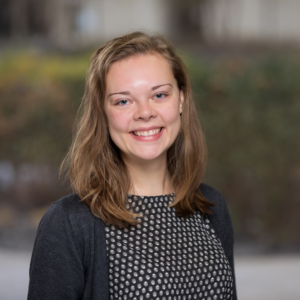#UMNMCH student Abby Fink (MPH 2021) wrote this reflection about her deployment with the Title V Needs Assessment Team at the Minnesota Department of Health. 
Abby’s Deployment with the Title V Needs Assessment Team
As an MCH student at the University of Minnesota, I have had the opportunity to intern with the Title V Needs Assessment team at the Minnesota Department of Health (MDH). Through this internship, I have learned invaluable lessons about data equity and accessibility.
What is a Data Biography?
Data biographies outline key information about a data set to help to ensure that the data is used responsibly, transparently, and ethically. Generally, data biographies list who conducted data collection, who the data belongs to, how the data were collected, where it was collected and where is it kept, how it will be used and why it was collected, how old the data is, and finally, how frequently the data are collected (Krause 2020).
How does the Title V Needs Assessment Team Use Data Biographies?
After the selection of Minnesota’s priority needs, the Title V Needs Assessment team helped facilitate strategy teams to engage community members and stakeholders in identifying strategies to address each priority need. To inform their decisions, strategy teams were given brief PowerPoints with state-level data on each priority need. One of the projects I worked on involved creating these presentations. When making these presentations, I helped to develop “data biographies” for each data source referenced. In our presentations at MDH, we included information about who collected the data, who it belongs to, where it was collected and kept, why it was collected, and how it is used. To take our transparency and accessibility efforts one step further, we also outlined the limitations of each data set.
Through this process, I learned that being transparent about the story behind the data, and the limitations that should be considered when interpreting it, is essential for ensuring that anyone from the community–no matter how familiar with data collection and analysis–can understand the data being presented. Data biographies hold those analyzing and using the data accountable and build trust with communities (Krause 2020). This experience highlighted important lessons for me on the ethical and responsible use of data. I learned how to communicate data in a way that is accessible for everyone and how to take the time to truly understand the story behind the dataset I am using before drawing any conclusions.
Data Biographies, COVID-19, & Racial Justice
Working through the pandemic and seeing how structural racism has intersected with COVID-19 to worsen health inequities has further cemented the importance of accountability and transparency in data collection, analysis, and publication. Good public health research and decision making that recognizes racism as an ongoing public health crisis and centers equity and justice needs to grapple with the questions that data biographies encourage. As public health practitioners, we need to reflect on and be honest about who data are collected by, why they are collected, who is doing the analysis, and what the limitations are. In particular, we need to be transparent and reflexive about how our data is influenced by and upholds systems of power and privilege. My deployment showed me how data biographies can be a useful tool for prompting this reflection and beginning to hold ourselves accountable.
Resources
–MDH Data Stories & Data Placemats Background Information
–MDH Data Stories and Placemats Toolkit (PDF)
–MDH Title V Maternal and Child Health Needs Assessment Plan (PDF)
Sources
Krause, H. (2020, May 14). An Introduction to the Data Biography " We All Count.
Retrieved April 12, 2021, from https://weallcount.com/2019/01/21/an-
introduction-to-the-data-biography/
Biography
Abby graduated with her MPH in MCH in 2021 and minored in Epidemiology and Population Studies. Her background is in reproductive health and social determinants. Abby received her BA in Global Studies and Spanish Studies with a minor in Public Health from the University of Minnesota Twin Cities. In her spare time, she enjoys baking, reading, and spending time outdoors with friends. Since graduating, Abby has been working as a Staff Research Assistant at the UMN Medical School.
–Read Student Spotlight archives
Interested in learning more about getting a degree in MCH? Visit our MCH Program page for more information.
#UMNMCH #UMNproud #UMNdriven